| |
| |
Photographer,
Location |
Images |
Comments |
|
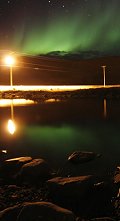
|
Sylvain Serre,
Salluit, Nunavik, Quebec, Canada
Aug. 30, 2008 |
#1,
#2, #3,
#4, more |
Tonight, not
a lot of northern lights, but it was fun to take pictures
of the Milky Way and the northen lights...
Photo
details: Canon
EOS 30D, 10mm, 15sec., f3,5, ISO 1600 |
|

|
Sylvain
Serre,
Salluit, Nunavik, Quebec, Canada
Aug. 26, 2008 | #1,
#2, #3,
#4, more |
On
Aug. 26th in northern Canada, the sky lit up with vivid
green auroras. There was no particular reason. Photographer
Sylvain Serre of Salluit, Quebec, lives under Earth's auroral
oval where the slightest shift of solar wind can spark a
midnight display like
this. "After a quiet start, the northern lights
were very bright and I didn't regret [being out and about]
so late at night," says Serre
Photo
details: Canon
EOS 30D, 10mm, f3,5, ISO 800-1600, 8-15 sec. |
|
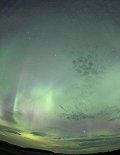
|
Bob Johnson,
Saskatoon, Saskatchewan, Canada
Aug. 9, 2008 |
#1,
#2, #3,
more |
Got another
call from Spaceweather
PHONE informing me of the possibility of Auroras in
my area. Went to a dark site and snapped some awesome full
sky images using my Canon
40D and Tokina fisheye lens, also got an Iridium Flare
which was right on schedule, also captured a meteor, beautiful
night. |
|
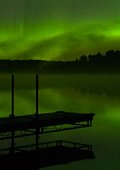
|
John and Sallie Carlson,
Lutsen, MN, USA
Aug. 9, 2008 |
#1,
#2,
more |
We were surprised by the intense activity of the aurora this evening. Beautiful auroras can indeed be seen even during solar minimum.
|
|
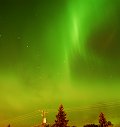
|
Don J. Signori,
Melfort, Saskatchewan, Canada
Aug. 9, 2008 |
#1 |
On August 9, 2008 the skies came alive over Melfort Saskatchewan with pinks & greens from an outstanding display of Northern Lights. Seen nestled within the glow is the familiar Big Dipper star pattern.
|
|
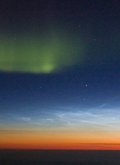
|
Jeff
Hapeman,
In flight 11,000m over Greenland.
Aug. 8, 2008 |
#1,
more |
On
my regular flight from Los Angeles to London, I kept an
eye for aurora. There was a very minor display, but I was
very pleased to see noctilucent clouds--the first I have
ever seen them. Here I was able to photograph both at the
same time. The clouds were very luminous--remarkably bright
and electric blue in color.
Photo
details: Canon
Rebel XSi, 24mm lens, f/1.4, 1.6s, ISO 1600. |
|
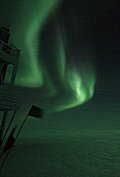
|
J. Dana Hrubes,
The geographic south pole, 90 degrees south latitude.
Aug. 1-4, 2008 |
#1,
#2, #3,
#4, more |
Normally,
the South Pole is snow white, but on August 4th, the landscape
around 90o S turned vivid green. What happened?
A plasma bullet struck Earth's inner magnetic field, sparking
bright Southern Lights. In the deep Antarctic night, everything
turned the color of aurora australis.
"These
auroras illuminated the ice surface enough to see the sastrugi
I was tripping over while I took the pictures," reports
J. Dana Hrubes, caretaker of the South
Pole Telescope and science leader of the Amundsen-Scott
South Pole Station. "We are enjoying the last full
month of aurora watching at the geographic south pole as
the sun will be making its return after 6 months on September
21st. In at least one of the photos you can see the South
Pole Telescope; it is blurry because it was scanning the
sky during the exposure. The bright 'star' is Jupiter."
Photo
details: Canon
Rebel XTi, 15 to 30 second exposures, 800 and 1600 ISO,
10 mm Sigma lens, f4.0. |
more
images: from
Jerry Zhu of Madison, Wisconsin |
|